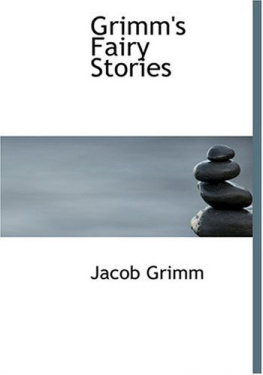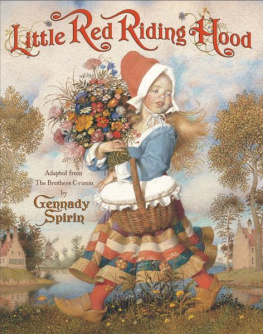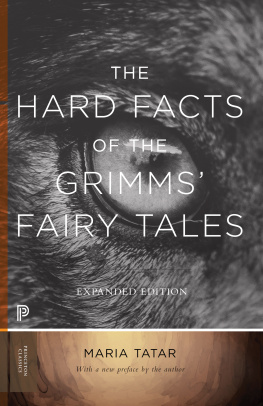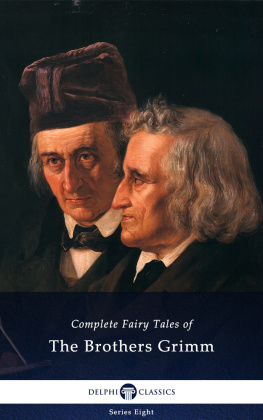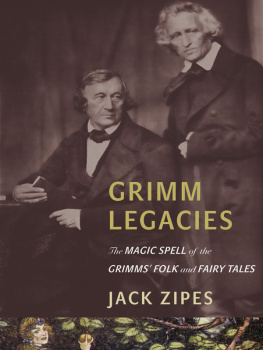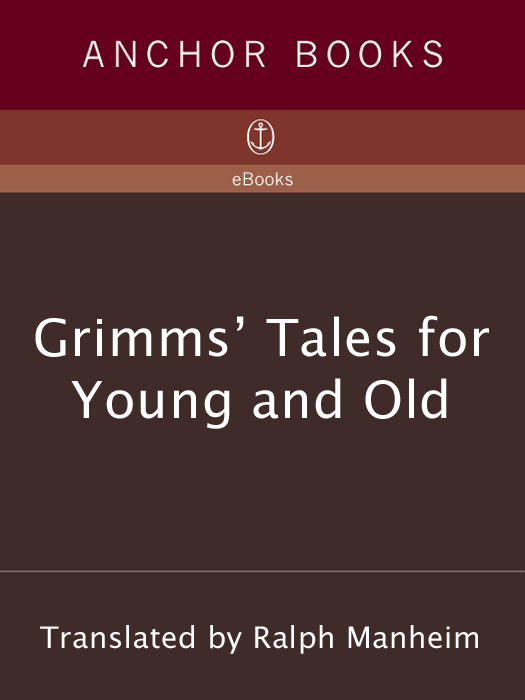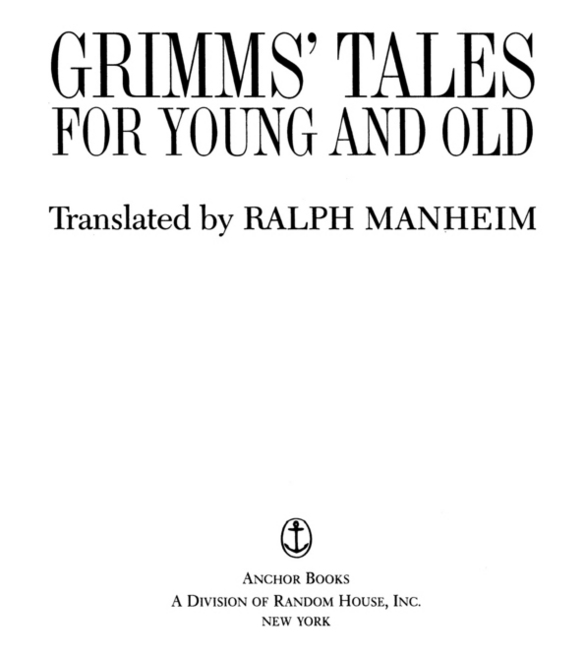FIRST ANCHOR BOOKS EDITION, 1983
Copyright 1977 by Ralph Manheim
All rights reserved. Published in the United States by Anchor Books, a division of Random House, Inc., New York and in Canada by Random House of Canada Limited, Toronto. This English translation originally published in hardcover in the United States by Doubleday in 1977. The Anchor Books edition is published by arrangement with Doubleday, a division of Random House, Inc.
Anchor Books and colophon are registered trademarks of Random House, Inc.
Translated from the Winkler-Verlag (Munich) edition of the Complete Kinder- und Hausmrchen
(Tales for Young and Old) by Jakob and Wilhelm Grimm, as first published in 1819.
Library of Congress Cataloging-in-Publication Data
Grimm, Jakob Ludwig Karl, 17851863.
Grimms tales for young and old.
Translation of Kinder-und Hausmrchen by
J.L.K. Grimm and W.K. Grimm.
SUMMARY : A new and modern translation of
the entire collection of folk and fairy tales written
by the Brothers Grimm.
1. Fairy Tales. [1. Fairy tales. 2. FolkloreGermany]
I. Grimm, Wilhelm Karl, 17861859, joint author.
II. Manheim, Ralph, 1907 III. Title.
PT921.G62 1977 398.210943 76-56318
eISBN: 978-0-307-78806-1
www.anchorbooks.com
v3.1
CONTENTS
Translators Preface
Some students of folklore have found fault with the Grimm brothers for improving on the tales they collected. The Grimms themselves claimed to have taken down the stories faithfully. Of course they improved on the spoken word; some storytellers are fluent, others hem and haw, and from the storytelling point of view there would seem to be no point in recording their hemming and hawing. But at the same time the Grimms were astonishingly faithful, undeterred by the irrational or unseemly. To appreciate their fidelity, one need only look at most English translations, where the puzzling Hans My Hedgehog becomes Hans the Hedgehog, where the donkey, instead of emitting goldpieces from both ends, merely spits them out, and the Devils grandmother, instead of lousing him, picking the lice out of his hair, merely strokes his head. More importantand this, I believe, is the greatest mark of their geniusthey make us hear the voices of the individual storytellers, and much more clearly I am sure than if they had been two tape recorders. In the German text the human voice takes on a wide variety of tonesmysterious, elegiac, hushed-and-frightened, poetic, whimsical, rowdy, solemnly or mock-solemnly moralizing, and so on. But everywhereor almostit is a natural human voice, speaking as someone might speak, and seldom if ever do we hear anything resembling the never-never, good-nursery, fairy-tale style prevalent in the English translations of these and other folk tales.
Why, in English, were they called fairy tales in the first place? For, despite a considerable population of devils, witches, goblins, and elves, there are, strictly speaking, no fairies in these stories, but only wise women, good or bad, of indeterminate age, not remarkable for their looks, and rarely equipped with wands, while the German word Mrchen means only a fantastic tale and is translated into virtually every other language by an equivalent of tale or story.
The reason is that when the tales first arrived in England, such absurdities were thought to be fit only for children, who were distinctly second-class citizens at the time. The adults of the reading classes were much too busy making money, Empire-building, and finding scientific explanations for the sun and everything under it, to bother with village idiots who get to be kings, tables that set themselves, or stupid peasant women with identity crises. And since the tales were addressed to children, they were termed fairy tales and, by and large, gift-wrapped in a fairy-tale style that was supposed to appeal to children.
In the present century, however, and especially in the last few decades, the Tales for Young and Old (a title much closer to the German Kinder-und Hausmrchen than Fairy Tales) have, with no change on their part, become more and more modern. Modern psychology has taught us that the human mind, like the folk tale, is a jumble of rational and irrational elements. Modern art and literature have broken down the barriers between genres and shown us the depth and beauty of the incongruous. And, as part of this general movement of desegregation, parents have moved closer to their children, the smaller ones at least.
Since the times had caught up with the Tales, since there was no longer any reason to rationalize or bowdlerize them, and since they are such wonderful stories, I thought the time had come to attempt a new translation that would be faithful to the Grimm brothers faithfulness. I have tried to use a simple, natural language, though when the original waxes literary (as in the story of A Sparrow and His Four Sons) I wax with it. I have tried to capture the tones of the various narrators. And, by no means least, I have paid close attention to descriptive detail, because the tellers of these stories were close observers and even their wildest fantasies, not to mention their comedies of village life, are set in houses, streets, and landscapes with which they were thoroughly familiar.
Especially in connection with such detail, but also in many other matters, I am deeply indebted to my friend Wolfgang Sauerlander for his help and advice.
R.M .
1
The Frog King or Iron Heinrich
I N OLDEN TIMES , when wishing still helped, there lived a king, whose daughters were all beautiful, but the youngest was so beautiful that even the sun, who had seen many things, was filled with wonder every time he shone upon her face. Not far from the kings palace there was a great, dark forest, and under an old lime tree in the forest there was a spring. When the weather was very hot, the princess went out to the forest and sat near the edge of the cool spring. And when the time hung heavy on her hands, she took a golden ball, threw it into the air and caught it. It was her favorite plaything.
One day it so happened that when she held out her little hand to catch the golden ball, the ball passed it by, fell to the ground, and rolled straight into the water. The princess followed the ball with her eyes, but it disappeared, and the spring was deep, so deep that you couldnt see the bottom. She began to cry; she cried louder and louder, she was inconsolable. As she was lamenting, someone called out to her: Whats the matter, princess? Why, to hear you wailing, a stone would take pity. She looked to see where the voice came from and saw a frog sticking his big ugly head out of the water. Oh, its you, you old splasher, she said. Im crying because my ball has fallen into the spring. Stop crying, said the frog. I believe I can help you, but what will you give me if I bring you your plaything? Anything you like, dear frog, she said. My clothes, my beads, my jewels, even the golden crown Im wearing. The frog replied: I dont want your clothes, your beads and jewels, or your golden crown. But if you will love me, if you will let me be your companion and playmate, and sit at your table and eat from your golden plate and drink from your golden cup and sleep in your bed, if you promise me that, Ill go down and fetch you your golden ball. Oh yes, she said, I promise you anything you want, if only youll bring me my ball. But she thought: What nonsense that silly frog talks; he lives in the water with other frogs and croaks; how can he be a companion to anybody?


